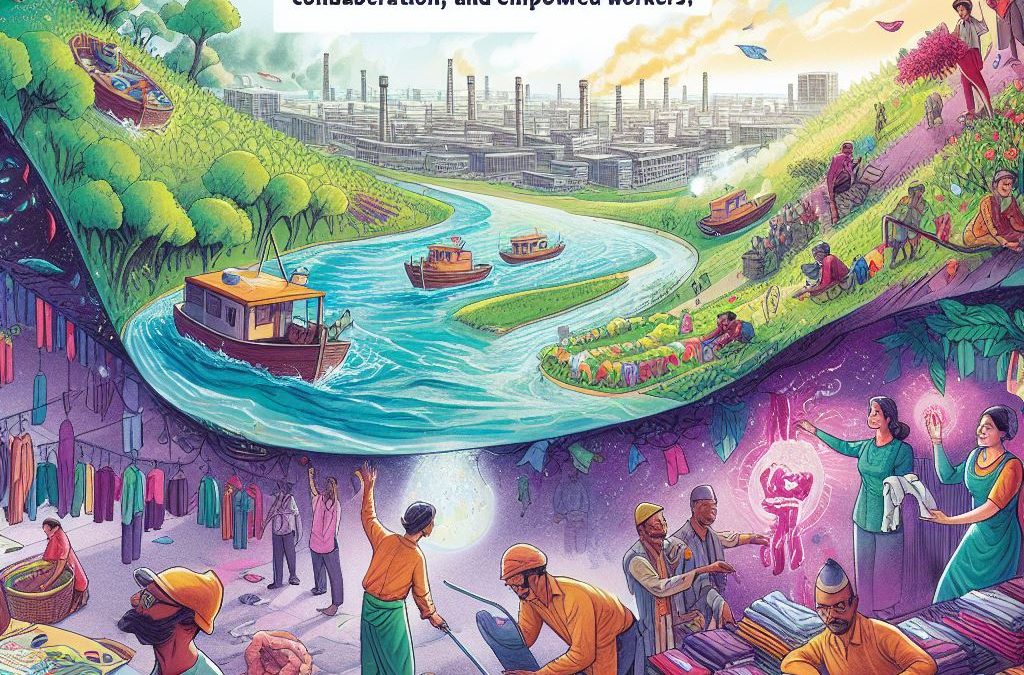I. Introduction
The garment industry is a cornerstone of Bangladesh’s economy, accounting for over 80% of the country’s exports and employing over 4 million workers, predominantly women. However, this industry is riddled with ethical issues that need urgent attention. This article delves into these ethical considerations, potential solutions, and the challenges in implementing these solutions.
II. The Ethical Issues in Bangladesh’s Garment Industry
A. Low Wages and Long Working Hours
Despite a recent increase to 8,000 taka ($95) per month, the minimum wage in Bangladesh’s garment industry is insufficient for a decent living. Workers often labor for over 10 hours a day, six days a week, highlighting the issue of low wages and long working hours.
B. Poor Working Conditions and Industrial Accidents
Unsafe buildings, lack of fire safety, inadequate ventilation and lighting, unsanitary toilet facilities, and forced overtime are common. Major industrial accidents, such as the 2012 Tazreen Fashions fire and the 2013 Rana Plaza building collapse, have resulted in numerous fatalities, underscoring the poor working conditions and industrial accidents.
C. Restrictions and Abuse Against Union Activities
Workers attempting to form unions often face abuse. Restrictions on union activities and harassment, violence, and false criminal charges against union leaders are prevalent, indicating a severe issue with restrictions and abuse against union activities.
D. Child Labor
Despite laws against it, child labor remains a problem. Children are employed in hazardous jobs, working long hours for low pay.
E. Discrimination Against Women
Women in the garment industry face discrimination and obstacles to advancement. They are often paid less than men for the same work, and maternity leave and childcare facilities are lacking, highlighting the issue of discrimination against women.
F. Health Issues and Harassment of Workers
Workers commonly suffer from health issues like lung disease, hearing loss, and exposure to toxic chemicals due to poor ventilation, noise, and lack of protective equipment. Verbal, physical, and sexual harassment of female workers is widespread, emphasizing the health issues and harassment of workers.
G. Environmental Pollution
Many factories dump toxic chemicals and wastewater directly into waterways, and air pollution from fabric treatments is also an issue, pointing to the problem of environmental pollution.
H. Fast Fashion Business Models and Lack of Transparency
“Fast fashion” business models promote rapidly changing styles, overproduction, and disposable garments, leading to negative environmental and social impacts. The lack of transparency in supply chains makes it difficult to trace labor abuses, highlighting the issues with fast fashion business models and lack of transparency.
III. Potential Solutions to the Ethical Issues
Addressing these ethical issues requires a multifaceted approach:
- Improving wages and benefits based on the actual cost of living.
- Stricter enforcement of labor laws and safety standards by the government, with regular inspections of factories.
- Mandatory safety upgrades to all factories, ensured by independent safety audits.
- Allowing workers to form independent unions and advocate for their rights without retaliation.
- Better healthcare access and improved working conditions for workers.
- Adequate break times, leave policies, and childcare support to improve conditions for women.
- Training and education programs to help workers advance and increase skills.
- Independent monitoring programs and certification programs like the Accord on Fire and Building Safety in Bangladesh.
- Long-term partnerships between brands and suppliers, providing stability and incentives to improve.
- Investment in green technology and sustainable practices to reduce environmental harm.
- Anti-harassment policies and confidential reporting mechanisms for workers.
- More transparency in supply chains to identify and resolve problems.
- Community investment by factories to benefit workers and their families.
- Shifting away from fast fashion business models focused solely on low costs and maximizing production.
IV. Challenges in Implementing Ethical Solutions
Implementing these solutions is not without challenges:
- Resistance from factory owners to additional costs and regulations.
- Lack of resources and training for factories to meet new safety and compliance standards.
- Difficulty in monitoring and enforcing standards given the large number of factories.
- Fear of job loss among workers if factories are forced to close over violations.
- Reluctance from Western brands to sacrifice low production costs and flexibility.
- Challenges in ensuring women’s rights in Bangladesh’s patriarchal culture.
- Workers’ distrust and fear of retaliation due to history of retaliation.
- Limitations of reforms and voluntary corporate social responsibility programs.
- Trade union issues, including politicization and lack of bargaining power.
- Disagreements over living wages and who should bear the costs – brands, government, or consumers.
- Difficulty tracing abuses in complex global supply chains.
- Time constraints in developing sustainable solutions.
- Risk of loss of business if Bangladesh raises costs compared to other low-wage countries.
V. Conclusion
Overcoming the ethical challenges in the garment industry of Bangladesh requires a collaborative approach between the government, civil society, brands, and workers. Brandex Sourcing Company stands as a testament to what can be achieved with commitment to quality control, affordability, on-time delivery, and a fair treatment of both the environment and workers’ health and safety. The journey towards ethical manufacturing may be challenging, but the destination is worth the effort. For those who are serious about engaging with a responsible partner in Bangladesh’s garment industry, the path starts with understanding the complex landscape of ethical considerations. We encourage you to read our detailed analysis in the article titled “Ethical Standards and Corporate Social Responsibility in Bangladesh’s Garment Industry” to grasp the nuances of these issues fully.
As you consider your next steps in sourcing or manufacturing apparel, remember that a responsible choice is not only good for business but essential for humanity and our environment. Reach out to us at Brandex Sourcing Company for a quote, and let’s embark on this ethical journey together. Your decision today will help shape a more equitable and sustainable future in the garment industry.
Feel free to contact us for more information or to request a quote. Together, we can make a meaningful difference.

